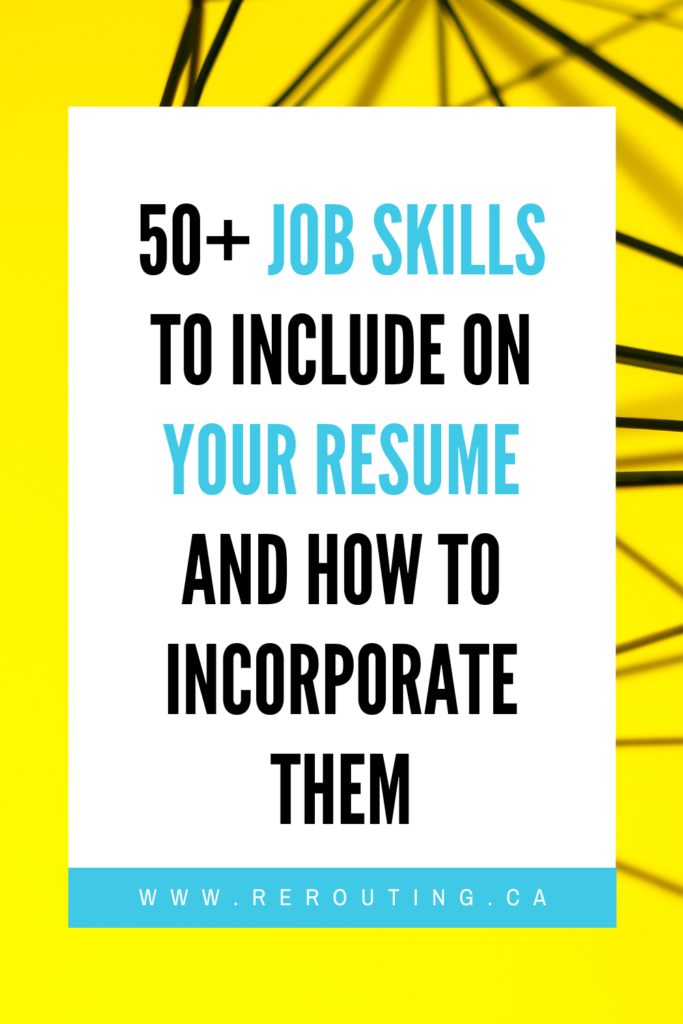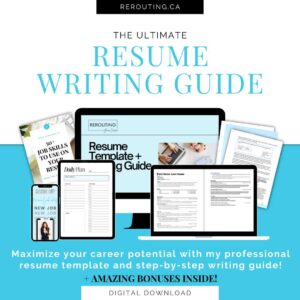
50+ Job Skills to Include on Your Resume and How to Incorporate Them
So, you are sitting down to either write your first resume or update your existing one and you aren’t sure what transferable skills and specialized skills you should list on your resume. Maybe you feel like you have too many skills and can’t decide which ones to select? Well don’t worry, I’ve got ya covered! In this blog post, we’ll go through a list of 50+ job skills to include on your resume and how to incorporate them.
Disclosure: This post may contain affiliate links, meaning ReRouting Inc. gets a commission if you decide to make a purchase through links posted on this site, at no cost to you. Please read this disclosure for more info.
I’ll answer some of the common questions job seeker have about jobs skills on resumes. More specifically, we will look at:
- The different kinds of job skills (transferable, specialized, soft, and hard skills)
- The types of skills you should include on your resume
- Where you should include your skills on your resume
- Lists of transferable and specialized job skills
First, let’s talk about what skills are and the different types of skills. A skill is simply something you can do well and are also often described as a competency. When it comes to skills that people use within a job or profession, you’ll often hear them described with various terms. There are transferable skills, specialized skills, soft skills, and hard skills.
What are transferable skills?
Transferable skills are abilities relevant across multiple areas of work. It is a skill that you might learn and develop in one profession that can be utilized if you were to move to other professions. For example, communication, analytical, data entry, etc.
What are specialized skills?
Specialized skills are often acquired through education, on the job training, and professional development. They are usually used within a given profession. For example, JavaScript, employment law, digital marketing, etc.
What are soft skills?
Soft skills are usually subjective opinions of a person’s ability. For example, one’s ability to work with others, their work personality, level of motivation, intuition, adaptability, emotional intelligence, etc. Soft skills are often difficult to teach. Soft skills can also be transferable skill.
What are hard skills?
Hard skills are measurable, and like specialized skills, they are often obtained through education and training. Or even through practice. They can be described as technical abilities or expertise. They are specialized skills, but they can also be transferable skills. For example, PowerPoint.
Now you are probably wondering which skills you should include on your resume…
Well, the great news is I am about to tell you what type of skills you should include on your resume and exactly how to incorporate them!
What Skills Should You Include on Your Resume?
 You want to include a mix of transferable skills and specialized skills – with a focus on specialized skills. The only time I would suggest including soft skills is when a company specifically asks for the skill within their job description (job posting). Take for example a company that has asked for a motivated/ energetic/ adaptable individual then these might be the keywords they are looking for within your resume so it would be great to figure out a way to integrate them. Since soft skills are often subjective opinions, it is harder to quantify them on your resume. They can be used as good descriptive words within your professional profile though!
You want to include a mix of transferable skills and specialized skills – with a focus on specialized skills. The only time I would suggest including soft skills is when a company specifically asks for the skill within their job description (job posting). Take for example a company that has asked for a motivated/ energetic/ adaptable individual then these might be the keywords they are looking for within your resume so it would be great to figure out a way to integrate them. Since soft skills are often subjective opinions, it is harder to quantify them on your resume. They can be used as good descriptive words within your professional profile though!
Think about how you can quantify the skill…
Before selecting a skill to add to your resume, think about the ways you can explain how you have developed and performed the skill successfully. In a job interview, you will likely have to talk about this! So, know and understand how you can quantify the skills you have listed on your resume. What examples can you provide that demonstrate that skill? What measurable results can you write about within the experience section of your resume? By understanding more about why you believe it is one of your top skills, you’ll better understand what skills you can and should list on your resume.
Only include skills that are relevant to the position you are applying for…
This is where targeting your resume comes into play. If you need help targeting your resume, I have created The Ultimate Resume Writing Guide to help you write a professional resume. Rather than listing all of the skills you have, select your top skills that apply to the position you are applying for. For each job that you apply for, you will have to evaluate what is already on your resume and whether it matches what the company is looking for.
List your skills in order of strength and importance…
When listing the skills on your resume, within the skills section, list them in order of strength (your strongest skills) and importance (what the employer is looking for).
If you cannot legitimately place the skills on your resume that are requested in the job description, you may want to reconsider if you are qualified for the job…
When I talked about tailoring your resume to the job description, I didn’t mean literally taking what they want and plopping it on your resume. Ensure your skills are aligned with what the company has established as their requirements. Don’t ever lie on your resume, only put the skills you legitimately have on it. If you are reviewing a job posting and can’t place the skills an employer is looking for on your resume, then maybe you are not qualified for the job.
Where Should You Incorporate Your Skills on Your Resume?
This is a common question asked among job seekers and quite often people assume that you only list your skills within the “skills section”. Well, I am here to tell you that you don’t need to limit yourself to only listing them within the 5-9 bullet point list. You can include your job skills in multiple areas of your resume, and you should! By incorporating your skills in more than just your “skills section” you will also have a better chance at passing an applicant tracking system (ATS) scan!
You should include your job skills in the following sections of your resume:
- Profile
- Skills Section
- Within Your Experience and Selected Achievements
- Additional Training
Keep your list short and concise within your “skills section”…
If the skills section of your resume is a bullet point list of short sentences explaining your skills, you may want to revisit the resume template or resume format you are using. The skills section of your resume should be a bullet point list, or a list separated by “separators” (|).
- Specialized Skill
- Transferable Skill
- When you write your skills out in sentences, they tend to get lost when a human eye is scanning your resume for keywords.
Get my point above? Always use a bullet point list for the skills/competencies section of your resume. When you write your skills out in sentences, they tend to get lost when a human eye is scanning your resume for keywords.
Looking for a professional resume template? I have carefully crafted this template that is optimized to pass the human 6-8 second resume screen and ATS scan. Also, if you are looking for action verbs to include on your resume, you may want to take a look at this blog post!
Alright, we have gone through what transferable and specialized skills are, when and how to include them on your resume. Let’s look at that list of job skills!
Let’s get to that list of 50+ skills that you can include on your resume. Now, this is just a list to help you get past writer’s block and fill in your resume template that you will alter for each job you apply for. Think of this list as a prompt to help you brainstorm YOUR TOPS SKILLS.
Here’s a List of Transferable Skills You Can Use on Your Resume
 Active Listening
Active Listening- Analytical
- Coaching
- Communication
- Computer
- Creative
- Critical Thinking
- Customer Service
- Conflict Management/ Resolution
- Decision Making
- Detail Oriented
- Editing
- Excel Macros
- Forecasting
- Interviewing
- Investigation
- Languages (French, Spanish, etc.)
- Leadership
- Management
- Microsoft Office
- Microsoft Word
- Negotiation
- Organizational
- PowerPoint
- Presentation
- Proactive
- Problem Solving
- Project Management
- Research
- Resourceful
- Results-Oriented
- Teamwork
- Time Management
- Training (Facilitation)
Here’s a List of Specialized Skills That You Can Use on Your Resume (selected examples)
- Customer Retention
- Contract Negotiation
- Counseling
- Employee Relations
- Food Safety
- Graphic Design
- HTML
- Intake Interviews
- Java
- Laboratory Safety Protocols
- Market Research
- Mediating
- Networking
- Petrochemical Solutions Process
- Product Development
- Protein Biochemistry
- Quality Control
- Recruitment
- Search Engine Optimization
- Social Media Marketing
- Strategic Prospecting
- Talent Management
- Web Design
Again, the lists that I have provided to you should help you brainstorm ideas to create a list of your own top skills that you can incorporate on your resume.
Wrap Up!
Alright, so in this post we have covered several factors to consider when inputting your skills on your resume. We looked at the different kinds of job skills (transferable, specialized, soft, and hard skills), the types of skills you should include on your resume, where you should include your skills on your resume. And ended with a list of transferable and specialized job skills. I hope this post helps you determine your tops skills that you should incorporate on your resume.





